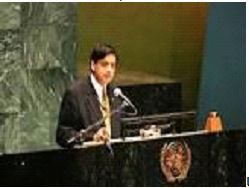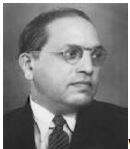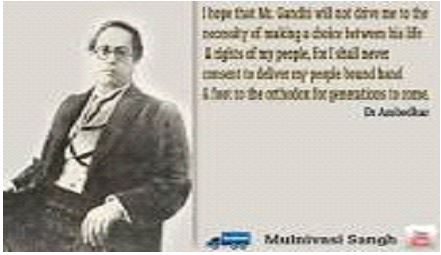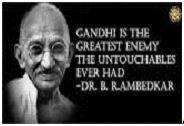 This article is a strange one for me in that I am writing to answer a politician in India who at one time achieved international acclaim more than any other politician in India. His name is Shashi Tharoor, and we have only one thing in common; we are both Malayalee! But other than that, nothing more. Mr. Tharoor became an internet sensation in 2015 for a speech he made at the famous Oxford Union at Oxford University. He came there to debate some of the British Academics about the time and lingering consequences of the British Empire in India. The main point of his speech was his assertion that Britain owes India over $50 billion of reparations for its absolute “maladministration of India.” According to Dr. Tharoor, when the British came to India, it was the wealthiest country in the world (responsible for a ¼ of the GDP of the world at the time) and they left it as the foremost symbol of poverty and degradation in the world in 1947. Before I give my answer, I should speak about Mr. Tharoor’s qualifications and credentials.
This article is a strange one for me in that I am writing to answer a politician in India who at one time achieved international acclaim more than any other politician in India. His name is Shashi Tharoor, and we have only one thing in common; we are both Malayalee! But other than that, nothing more. Mr. Tharoor became an internet sensation in 2015 for a speech he made at the famous Oxford Union at Oxford University. He came there to debate some of the British Academics about the time and lingering consequences of the British Empire in India. The main point of his speech was his assertion that Britain owes India over $50 billion of reparations for its absolute “maladministration of India.” According to Dr. Tharoor, when the British came to India, it was the wealthiest country in the world (responsible for a ¼ of the GDP of the world at the time) and they left it as the foremost symbol of poverty and degradation in the world in 1947. Before I give my answer, I should speak about Mr. Tharoor’s qualifications and credentials.

He is no mere politician like many of the people who serve in the lower house of the Parliament of India. He was educated in several Catholic private schools from childhood all the way to university. His family was from the region of Palakkad in Kerala. His parents were in London until he was 2 years old. They were well enough financially to send him to these schools, some of the finest in India. Tharoor worked hard and was distinguished in his education. He went to the United States to pursue a Master of Arts degree in International Relations at The Fletcher School of Law and Diplomacy at Tufts University in Medford, Massachusetts. He achieved a second graduate level degree at this same college, and later a PhD in International Affairs. He won an award for being the best student at Tufts University, and at the age of 22, became the youngest person to receive a Doctorate at this institution. From here, he began a diplomatic career in the United Nations.

From 1978 to 2007, he served in several capacities in the United Nations, beginning as a staff member of the UN High Commissioner for Refugees during the Vietnamese Boat People crisis in the aftermath of the Vietnam War, and culminating as an Under Secretary and an Executive Assistant to former UN Secretary General Kofi Anan. (I do not know what he did on the field in such positions or if he just collated information coming from the field.) He also made a run for Secretary-General position after Kofi Anan but was defeated by South Korean diplomat Ban-Ki Moon. (According to some sources, the permanent member nations of the Security Council had enough of a “strong general secretary” and purposely voted against Dr. Tharoor.) Had he won, he would have been the youngest person to hold that position at 50 years old. After his time in the United Nations, he returned to India and began his political career there. Prior to this, he became the chairman of a Dubai based company. (Always good to start off a political career with a decent amount of money!) He ran to become a Member of Parliament representing Trivandrum as a candidate for India’s Congress Party. He won the election and has remained in that position ever since. Meanwhile, he has been active in various administrations and governments in India diplomatic corps as well as chairing committees on technology and modernization. Next to Prime Minister Modi, he is India’s most visible political figure.
Mr. Tharoor is very distinguished as a diplomat and academic. He is also very well spoken, charming, charismatic, and attractive, an absolutely lethal combination that reminds me of another Indian, Ravi Zachariah. (I will leave the comparison there.) But as distinguished and learned as he is, I believe he is completely wrong about the British owing India financial reparations of any kind. I believe that the premise of his whole argument is wrong as well. But it is not because I discount the atrocities of colonialism. India’s current problems are a lot more complicated and more deeply rooted than solely the history of the presence of the British Empire in the Indian subcontinent. What’s more, present day India can take care of its own problems now.

It is easy to exploit “White Guilt” in the West. That “guilt” is something that is missing from almost any other racial group or region of the world. Unless confronted by the Western world, the people of Japan will not display a public feeling of remorse for its atrocities in China, Korea, and other territories it conquered before and during World War 2. Turkey will not broach the subject of the Armenian Genocide. Alexander Solzhenitsyn mentioned that the Soviet Union, the modern nation of Russia, has never dealt with atrocities of Communism inflicted on millions, and they do not want to. (President Putin said of the subject, “We do not want our people to think that our fathers and mothers lived in a nation of lies and evil.”) But in the West, the Whites are given to a perennial inferiority complex which is constantly exploited in many universities and colleges by left leaning academicians. And the more distinguished the institution, the more pliable to such argument as ‘reparations.’ This is a disservice to Whites as a whole and an insult to the people of a nation like India, or any other clamoring for such money.
Let us get to the heart of the matter. The history of India does not begin with the British. India is a nation of at least 3,000 years of history in an area of influence that stretched from modern day Afghanistan, all the way through the Indian subcontinent and to Indonesia. Its history is much more complicated than what most people know, especially its modern history. One thing that must be realized first is that India was never a united country as we know it presently until the British made this possible in their time in India. I will not discount the bad sides to this history, which Tharoor sites, but then again, every empire, dynasty, and conqueror who ever came to this area of the world have all committed their own set of tragedies on the people of this land. If he is arguing the point that the British plundered the country for their “home office” in London, and left nothing but degradation in India itself, that is too far from the whole story.
There is no argument that India was the richest country of the ancient world at one time. It was this fact that made it and China a desirable conquest for many kingdoms and conquerors in the Eastern hemisphere for millennia. Many of the world’s most famous diamonds, such as the Kohinoor Diamond (one of the diamonds set on the Crown of the Queen of England), came from India. India’s spice and textile industries, historically, have been famous and continue to be. The European explorers, beginning with Columbus, were looking for a way to get India by sailing West, hence the association of the Native American tribes as “Indians.” India still has remnants of its greatness during the times before the British, particularly during the times of the Muslim empires that conquered India. But there is a catch. India was never a united country, and despite its enormous wealth, the life of most of the population of India was not one of comfort, or something to emulate. Far from it.
To whom should the British pay reparations? The Muslim rajas, the Hindu Brahmins, the Rajputs? Should it pay the Dravidians in the South? The Aryans in the North? To whom? India was never one nation. And what was worse, it was a country of people groups and caste systems that mutually despised one another, and any idea of human rights and/or worth was warped. That is not my assessment. That was the assessment of a man named Siddhartha Gautama, known more by his title, the Buddha. His ideas became, in essence, a protest against the Hinduism of India. We will get to this point later, and through another individual who espoused it in the last century, because it probably demonstrates why the British deserve more thanks for their time in India rather than curses or upbraiding.
No empire that was in India was passive toward the local population. For instance, last year, the Hindus laid the stones for a new temple called Ram Mandir in the city of Ajodhya in Utter Pradesh. The news was broadcast to the whole world, yet I doubt if most people knew the history and the tragedy with regards to the temple. The Hindus claimed, the site of the temple was the birthplace of Rama, the hero of the Ramayana (a myth). All of this would have no bearing except for the fact that from 1529 to 1992, on this particular site sat a mosque called the Babri Masjid, built by Babur, the founder of the Mughal Empire. The Mughals brought to India the presence of Islam. In the zeal of their religion and the command of their prophet, they made it a policy to destroy temples, and on their ruins, build mosques. This policy was carried out with terrible wars and blood baths. According to another famous internet personality from India called Sadhguru, the Babri Masjid needed to be destroyed and the Ram Mandir Temple needed to be built on the site. The reason? According to Sadhuguru, Babur and many of his successors were blood thirsty and engaged in horrifying cruelty and genocide. They too plundered India’s treasures and enslaved its people. (By the way, Sadhuguru prefaced his statement by saying that this was not an indictment of or an incitement against India’s present day Muslim population “who are peace-loving.”)
Perhaps what Dr. Tharoor should consider is that India’s greatest treasure is not its natural resources, diamonds, arts, trade, spices, silk, or anything else. India’s greatest treasure is her people. It’s the one part of India’s evolution to democracy that has the most problems, and Dr. Tharoor is not going to like my reason for it.
There would be no modern-day India without Great Britain, and because of the Hindu Caste System, 70% of its population would be as downtrodden as possible with no chance of upward mobility in any way shape or form. There would be no justice for all or even a chance for such an idea. Ironically, two men from two different backgrounds came to this conclusion. One was Prime Minister Winston Churchill. The other was Dr. B.R. Ambedekar, the first Justice Minister of the Republic of India and the man most responsible for writing the constitution of that nation, the longest such document in the world. Both of these men equally detested Mahatma Gandhi from two different perspectives, but they were united correctly on this one point. In a Hindu world, the rights of the lower classes will be utterly trampled. This one point is the point that more than tips the proverbial balance regarding Dr. Tharoor’s assertion that the British owes reparations. They made it possible to break a system which by its very nature was meant to suppress the underclasses.

While Churchill can be discounted by most of Shashi Tharoor’s supporters as the greatest defender of the British Empire, Dr. Ambedekar is not so easy to dismiss as a “colonizer.” He was a victim of the worst kinds of prejudice, and seemingly against all odds, rose up over it, and as I said, he was not a supporter or admirer of Mahatma Gandhi. To get an idea of the prejudice that he experienced, I would recommend that one read his biography and hear some of the stories connected with his life. He was born into what Hinduism calls the outcastes, the Untouchables. These were people not considered as people, in the world of Hinduism. In previous times, they would not have been afforded any chance at education or any other livelihood or promotion other than for mere survival while being considered no better than a “breed” of animal. Through the time of the British Empire, this began to change.
Schools were started by missionaries, and acceptance was broad based on merits. Ambedekar was able to go to the Elphinstone High School for his secondary education, the first “outcaste” student there. His education there (and also in his elementary years) was not in the classroom; he was not allowed inside by the upper caste Indian instructors to be “with his betters,” yet they were unable to withhold education from him because of the White administrators. One of the most demeaning aspects of his experience during these years was that despite his outstanding academic performance, he could not get a cup of water to drink with all the other kids. (This ironically reminds me of the incident of Jesus and the Samaritan woman in John 4.) If he wanted water, he would have to raise his hand and ask his teacher, who then would relay that message to someone on the second floor of the school (where the administrative office was) and if there was a peon (a worker or attendant) available, they would lower a rope with a bucket into well, pull it back to the second floor, and the peon would pour the water from up there on the face and mouth of this outcaste student, who in Ambedekar’s case, was academically the best student in that school. “Many days, there would be no peon,” Ambedekar remembered years later, “and on those days, you just suffered.” This man’s academic performance was such that he was given a scholarship to study at Columbia University in New York, and later at the London School of Economics in England. He achieved two Master’s Degrees and four Doctoral Degrees in his time overseas. And he was still considered Untouchable by the Hindus of India, which brought him to his collision course with Mahatma Gandhi.


Ambedekar and Gandhi had only one thing in common, a mutual animosity toward White Britain. But other than that, Ambedekar realized that Gandhi’s talk against the British would not do any favors for the Untouchable masses of India. Gandhi favored the Caste system, and when this term became politically incorrect, he changed it to the word Varna, loosely translated as “people group” in English. But other than the changing of the term, nothing else changed. Ambedekar refused Christianity as the answer to the problem, after all, he reasoned, “The British were Christian.” He believed that Buddhism (a religious alternative from India) was the answer. It does not work at all either, but we do not have time right now to discuss that. The point is, just as Buddha a millennia before, Ambedekar was looking for resolutions to social ills and problems caused by the Hindu worldview. Problems that would not change or could not be changed because it was considered Karma, a fate to be accepted in this life and not altered, lest one fall to the lower ends of reincarnation! Spiritually, Ambedekar followed Buddhism, but pragmatically, particularly after he became the first Justice Minister of the Republic of India, he followed the British legal system (and such documents as the U.S. Constitution and Bill of Rights as well). Providentially, he was asked by Prime Minister Nehru to head up a committee that would write a new constitution for the Republic of India. He ended almost composing the whole document himself, which ended up being the longest such document among the countries of the world that have such constitutions. One source described the document as a “social instrument” that was made to address every type of social evil that the lower castes of India have experience for millennia, and to rectify as much as possible the same ills. Perhaps Dr. Tharoor and others who share his belief in reparations should ask why Dr. Ambedekar intentionally made such a long document which addressed all these issues with regards to the “Untouchables”?
What does India owe Indians? In such a giant of a nation that is supposedly a rising economic power, why are tens of millions trying to go somewhere else, permanently? Dr. Tharoor’s assertions on financial reparations are ridiculous. The world is changed. Technology and science have changed the economic futures of the world many times over. If nations like Japan and Singapore, and even the “Tiger” countries of Southeast Asia, can rise economically after war a century of war and social upheavals, then India can definitely do it now, if the current government continues to open its markets rather than keeping them closed, as they did during the first 40 years. It can become a nation with running water and constant electricity and indoor plumbing and air conditioning, a nation without slums and horrific sex trades and slave markets.
My point is this: if India cannot give its own people basic dignity and human rights without the specter of fear or intimidation, what then is the point of an independent nation? If the British managed with all their faults to give India a sense of value for her most trivial of people groups, and thereby for all her people, then I believe they have more than paid the price, and something for which every person in India’s one billion population should say thank you!
It was because the British nation had a moral conscience of some kind which made the possibility of a united India first, and then a nation where the ideal of law and order reaching to each person in society could be realistically pursued. Even India’s independence movements could not have happened at any other point in her history! So, Dr. Tharoor, please say thank you to the British. Even now, you owe them so much!